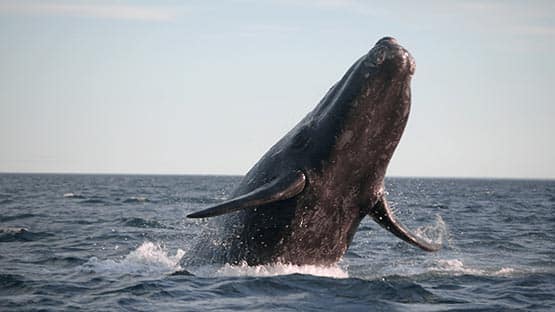
Like birds who migrate to warmer weather, the North Atlantic Right Whale is also moving on their East Coast migratory route to warmer coastal waters – and government intervention would be helpful to protect the endangered species from deadly boat collisions, according to Oceana.
The North Atlantic Right Whale Consortium recently released its new population estimate for North Atlantic right whales, which stands at only around 340, including around 80 breeding females.
Oceana has filed an emergency rulemaking petition with Secretary of Commerce Gina Raimondo and assistant administrator of the National Marine Fisheries Service Janet Coit demanding immediate action to save critically endangered North Atlantic right whales and to ensure the protection of pregnant females, lactating mothers and calves during the current calving season.
North Atlantic right whales are especially vulnerable to being hit by boats during the calving season since the mothers and nursing calves spend more time swimming at the water’s surface, increasing the possibility of boat strikes.
Earlier this year, the National Marine Fisheries Service proposed new vessel speed regulations to address the ongoing threats affecting North Atlantic right whales.
While final changes to existing rules are not expected until late 2023, the calving season is currently underway off the southeast U.S. coast from South Carolina to Florida.
“We are sounding the alarm for our government to step in and establish immediate protections for North Atlantic right whales during the calving season. As the nation’s steward of our oceans, it is Secretary Raimondo’s responsibility to take action to protect these critically endangered whales,” said Oceana campaign director Gib Brogan. “Right whale mothers are currently heading south to the warm coastal waters of South Carolina, Georgia and northern Florida to calve with grossly inadequate protection.”
The whales are faced with a number of life-threatening perils along their journey – boat collisions and entanglement in fishing gear remain the top two causes of death for the species.
“While broader and permanent safeguards are desperately needed, the government must take immediate action now to protect these mothers and their newly born calves today,” said Brogan.
Oceana is asking the National Marine Fisheries Service to use its authority and responsibility under the Endangered Species Act and Marine Mammal Protection Act to implement the following measures immediately until the updated final rule is in place:
- Modify the seasonal speed zones for the Atlantic, Great South Channel, North Carolina, South Carolina and the Southeast region as defined in the Proposed Amendments;
- Implement the mandatory dynamic speed zone “framework” as defined in the proposed amendments, while enhancing and clarifying the DSZ trigger to include the presence of a mother-calf pair, instead of limiting the trigger to “three or more whales in close proximity;” and
- Expand the size class of boats currently subject to speed restrictions to include most vessels greater than or equal to 35 ft in length.
Multiple studies show that slowing boats to 10 knots reduces a North Atlantic right whale’s risk of death by boat collision by 80 to 90 percent.
“Every North Atlantic right whale birth offers a chance for recovery of this critically endangered species. With birth rates down and continued deaths from human causes, the window for being able to turn the tide for these whales is frighteningly narrow. Our government has the necessary tools to give them a fighting chance for survival and it should implement them immediately,” said Brogan.
Scientists estimate that less than one North Atlantic right whale per year can perish due to human causes in order for the species to have a chance at survival and recovery.
Visit www.USA.Oceana.org to learn more.
Related stories
Coalition hires counsel to protect endangered right whale from offshore Virginia wind project
Do rules to save Right Whales sacrifice the lobster industry?
Why are so many gray whales washing up dead on west coast beaches this spring?
Do scientists have any idea why so many whales are dying in the Gulf of Alaska lately?
Emperor penguins on the brink of extinction: What can be done to save the species?










